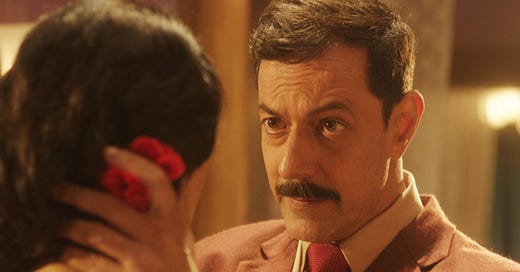Dear Moviegoers,
Indeed, the blog/newsletter’s name has been updated once more, and subscription options have been re-added. Enjoy.
:)
In reading the official press liner notes for RK/RKAY, it becomes clear as to what films that the filmmaker used as reference. Woody Allen’s The Purple Rose of Cairo comes up, as does the Spike Jonze/Charlie Kaufman Being John Malkovich. Indeed, Rajat Kapoor’s meta independent feature - where he plays a version of himself who is then confronted by a created character version of himself - looks like those two and sometimes feels like those two, but is very much from one person’s mind and shared heart. Shared, in how he recognizes that everything is borrowed, and it always takes a village.
With Purple Rose of Cairo, RK connects mostly with the living nature of cinema, changed up here as the act of filmmaking itself instead of the performance of exhibition. It’s romantic very much to the sheer attraction and wonderful reflection that production and editing can bring, and to the catharsis in watching a finished cut. With Being John Malkovich, RK connects in making the improbable literal, when the imaginary becomes animated all of a sudden. Like flashes of light. These films do share common traits, but in RK/RKAY’s case, the difference is big enough to make its own stand. That difference being Rajat Kapoor’s alternates.
This is the story of RK (Rajat Kapoor as himself but maybe not totally himself), a famous actor and director in India who is working on his latest project, where he plays the leading character Mahboob. After coming under schedule and under budget, he finds creative difficulty in the editing room, which manifests when Mahboob escapes the confines of his world and walks into RK’s.
Having read the synopsis beforehand, I was not expecting such a twist. I imagined a more psychological crack happening, as opposed to a more magical one occurring. Still, it was a lovely moment when Mahboob changes his fate and just walks out and wanders. When he eventually meets his maker, it’s no happy introduction. There’s confusion, aggravation, and some anger, which only compounds day by day as Mahboob moves in with RK’s family, and charms everyone around him. Rajat Kapoor as RK and Mahboob must’ve been quite a challenge, as both men couldn’t possibly be more different in outlook and attitude. nor more strongly and tightly connected. No matter the circumstance, Kapoor was most assuredely up for his own task, playing himselves and directing himselves (as himselves too) with natural confidence and passionate effort.
Which man is the id and which is the primary? Is one determining the other’s destiny? Maybe that doesn’t matter, but it’s neat to think about. But, this is no headtrip. For all of the references and influences and logic that appears to be confounding, the film is ultimately pretty simple. Very simple. It may not be basic, but it’s also not too bold.
The title of the film brings up three things in my mind: The director’s name, his character names, and RKO Pictures which, interestingly enough, connects us to Orson Welles, who himself dabbled in the meta and the deeply personal from time to time. It reminds me of Welles describing The Other Side of the Wind in They’ll Love Me When I’m Dead, specifically how the movie within the movie would be a Welles picture masked as his avatar - or maybe that was vice versa. But audiences need not be too concerned with these predicaments, which likely mean more to the director than anyone else, as RK/RKAY is as easy of a watch as movies can get, and more enjoyable than most. The story as a Russian nesting doll of arcs stacked upon one another actually flows exceedingly well, even triumphantly so.
It’s not difficult to love RK/RKAY as a critic or as a general moviegoer, since the film isn’t at all speaking above any of us. In fact, it’s not even at all reaching farther than it can see. RK/RKAY is certainly lovely, certainly kind, and certainly that’s that. And… that’s ok. Maybe deflating, but ok. There’s an almost zen quality to the film that’s infectious, as it all seems so at peace. It uses past markers as influences yes, but does the film take more than it gives? No. In fact, this is a film about giving, whether it’s in new beginnings or striking ends. And I’m sure Rajat Kapoor’s work has influenced some new beginnings for future filmmakers, giving them ground to launch from. Where he stood, they may build higher. That’s nice. 3.5/5





